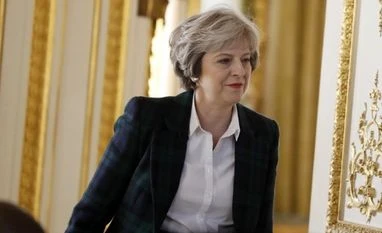UK PM Theresa May warns potential rebels over Brexit Bill
Opposition lawmakers were to begin debating amendments on Monday
AFPPTI London British Prime Minister Theresa May warned pro-European members of her Conservative Party on Monday not to "obstruct" Brexit by seeking to amend a bill empowering her to begin the negotiations.
MPs overwhelmingly backed the first stage on Wednesday of a bill to start Britain's withdrawal from the European Union, but opposition lawmakers were to begin debating amendments on Monday that could tie the ministers' hands.
A Eurosceptic Conservative lawmaker claimed at the weekend that 27 of his fellow MPs were planning to support some of these "wrecking amendments" during three days of discussion at the House of Commons.
But May warned MPs: "This House has spoken, and now is not the time to obstruct the democratically expressed wishes of the British people."
The government was forced to introduce the bill after the Supreme Court ruled that only Parliament could start Brexit, and it is under pressure to get it passed quickly.
May has promised EU leaders she will trigger Article 50 of the Lisbon Treaty, beginning the two-year exit process, by the end of March.
To speed up the passage of the bill through the Commons and the unelected upper House of Lords, the government kept it short -- just two clauses.
But opposition MPs have tabled more than 140 pages of amendments covering areas such as parliamentary scrutiny of the negotiations, the government's priorities and the involvement of Scotland, Wales and Northern Ireland.
Some of May's Conservative MPs have expressed particular concern about her promise to leave the EU and the single market with no new trade deal in place if she cannot agree on a satisfactory agreement within the two-year timeframe.
This would mean Britain falling back on World Trade Organisation rules and tariffs, with potentially damaging effects on the economy.
At least one amendment to be debated tomorrow calls for parliament to decide on whether or not the deal will be accepted, with the option of staying in the EU if it is rejected.
"If there is no deal then the government will determine what happens next. I think it should come into parliament," MP Anna Soubry told the BBC on Sunday.
However, this would require the other 27 EU countries agreeing to extend the negotiating period to allow for further discussions on a new deal.
Only one Conservative MP, committed Europhile Ken Clarke, voted against the bill last week.
Subscribe to Business Standard digital and get complimentary access to The New York TimesSubscribeRenews automatically, cancel anytime
Here’s what’s included in our digital subscription plans
Access to Exclusive Premium Stories
Complimentary Access to The New York Times

News, Games, Cooking, Audio, Wirecutter & The Athletic
Curated Newsletters

Insights on markets, finance, politics, tech, and more delivered to your inbox
Market Analysis & Investment Insights
Seamless Access Across All Devices













)
